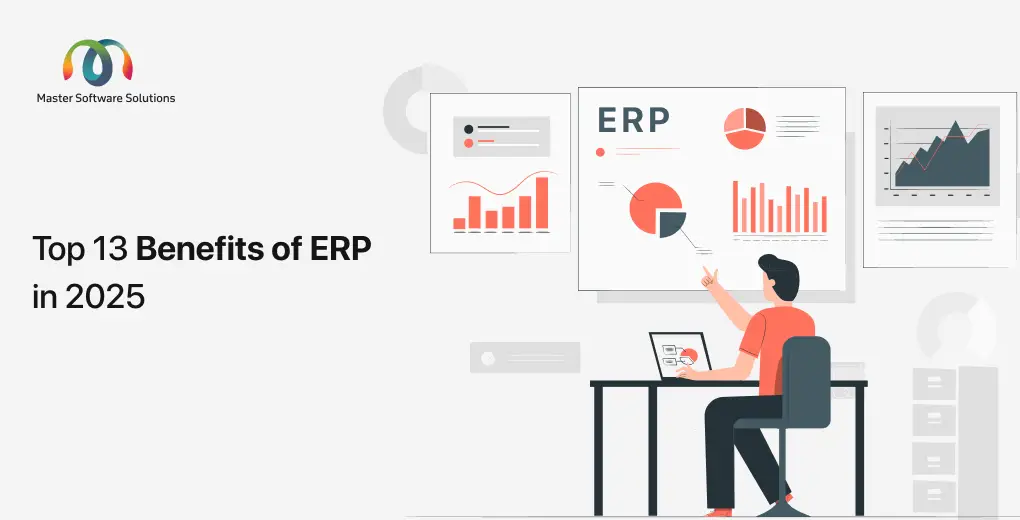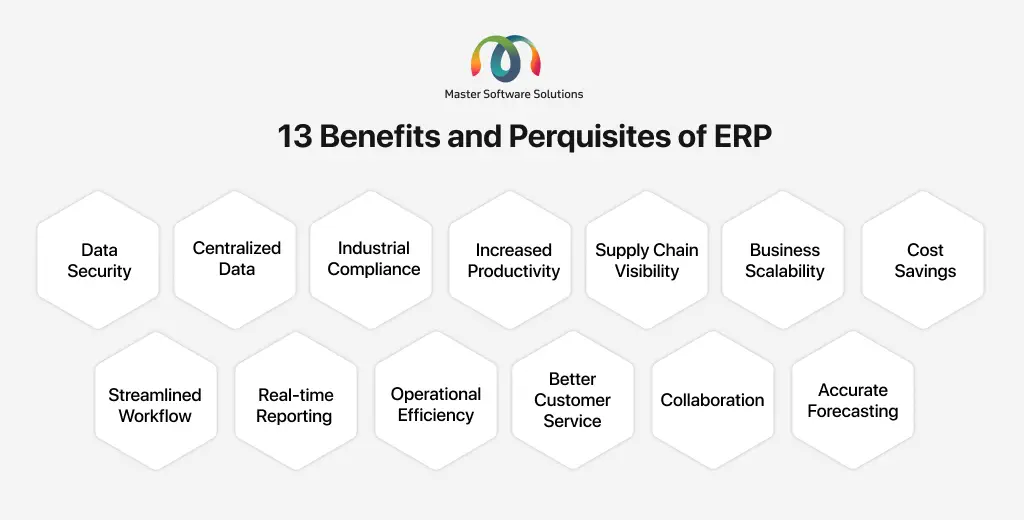Top 13 Benefits of ERP in 2025
How will ERP help my business?
This is the first question that comes to mind when a business owner considers implementing an ERP system. Enterprise resource planning (ERP) is a cloud platform that acts as a centralized database for your entire business, providing functionalities for real-time reporting and analytics and ways to improve operational efficiency and productivity while reducing costs and improving profits.
53% of organizations report a positive ROI from ERP implementations.
This blog will help you understand what ERP can do for your business. How can it help you enhance operations? And what are the features it offers to help you with business growth?
13 benefits and perquisites of ERP
An ERP is a cloud end-to-end solution that can help you to manage and track business operations. It consists of multiple business ERP components that can help improve business efficiency, productivity, and return on investment.
Data security
Data is a crucial component that empowers businesses to make informed decisions, innovate, and improve the efficiency of various business operations. It enables them to track and monitor financial and operational health. The ERP is a centralized platform that stores all your data in one place rather than scattering it in multiple systems, keeping it clean and ensuring data integrity.
The system removes the need for multiple systems and paperwork or sending data updates through emails. Implementing an ERP enables a seamless flow of updated data from one business department to another, ensuring data accuracy. In a cloud-based ERP system, the data is distributed in multiple remote servers, protecting it from a single point of failure. This adds an extra layer of protection and secures business data, especially sensitive customer information.
The ERP system also offers user-based permissions to restrict and decide who can view and edit data. This reduces the chances of fraud and data manipulation.
Centralized data
Centralizing data is crucial for improving data quality, enabling better decision-making, and improving business efficiency while minimizing silos and enhancing compliance. Without an ERP, businesses depend on multiple systems and spreadsheets to manage their data, making it difficult to track it when needed. This can lead to duplicate data and inconsistent formats, resulting in more challenges.
A significant 99% of businesses face data complexity and integration-related challenges.
The ERP stores all your business data from multiple departments in one place and the same format, maintaining data consistency. This standardizes your data and offers advanced reports and analytics to make informed decisions and save money and time.
Industrial compliance
Industrial compliance is necessary for any business for employee safety, environment protection, and maintaining a positive reputation. To comply with industrial regulations effectively, you need accurate, up-to-date records essential for audits. This can reduce your search efforts and save time. The system provides customizable reports to enable you to track and monitor compliance and adjust operations accordingly. Doing so can help the auditor find all the required documents efficiently.
ERP systems support specific regulatory compliance, providing updates about regulation changes to ensure you remain compliant. Maintaining compliance without an ERP platform is difficult, especially in a highly regulated industry.
Increased productivity
ERP can boost operational productivity in numerous ways, including automating repetitive tasks such as data entry, freeing your employees to focus on more strategic tasks, and bringing value to your business. Implementing an ERP system streamlines operations, making them more straightforward and reducing time spent searching for relevant information. The user-based data visibility to the employees makes it accessible, so they don’t have to ask about the processes or specific data sets.
Enhanced productivity with ERP removes the need to add to headcount, which otherwise would be necessary. This can minimize the significant workload on employees and allow them to focus on skill-based tasks.
Supply chain visibility
Enterprise resource planning comprises various business management modules and stores all your data in one place for real-time data and analytics, inventory tracking, manufacturing monitoring, and supplier relationships to improve decision-making and optimize operations.
All your business departments have all the information, empowering them to track process statuses and data managed by other departments. This helps employees to improve task efficiency and mitigate time and effort.
Business scalability
The ERP platform includes multiple business modules, including CRM, manufacturing, inventory, supply chain, and others, providing a modular architecture. The businesses can add or remove these modules based on their requirements. The system can scale and adjust with your business as it grows and evolves.
Cloud-based ERP platforms provide the most scalability opportunities with high speed, performance, security, and scale, enabling businesses to grow.
Cost savings
This is the most convincing reason for business owners to implement an ERP system. The system automates processes that can remove many administrative and operational costs. It can eliminate manual data entry and long paper trails.
Monitoring your business in real time empowers you to identify operations with higher expenses and implement strategies to optimize them. The system can help you manage rush orders, overproduction, and overordering, which can increase costs.
Streamlined workflow
Often, tasks are done in a certain way, not because they are efficient but because they have been done this way for years. ERP can help you find more efficient ways to improve processes and get them done faster and easier. It automates processes to ensure tasks are executed and performed correctly and provides real-time visibility.
You can define parameters to automate and sequence actions to perform a specific task. The ERP solution can optimize repetitive tasks within various business departments such as data entry, tracking, and analysis. The ERP platform offers real-time visibility into operations.
Real-time reporting
Real-time reporting is essential to making quick, data-driven decisions, adapting to market changes, and improving operational efficiency. The system provides endless capabilities to generate customized reports across the entire supply chain, including inventory, finance, orders, purchases, sales, marketing, and others.
You can calculate, track, and monitor your pre-defined business key performance indicators (KPIs). You can compare the KPIs of one operation with the other to understand why the business is growing or going down.
Real-time updates on these KPIs can help businesses make instant decisions to improve performance and promptly deal with disruptions.
Operational efficiency
The ERP platform touches every business operation and improves their efficiency. The system automates tasks, integrates business operations, and optimizes workflows, streamlining processes, improving accuracy, enhancing productivity, and reducing costs.
Real-time reporting and analytics enable businesses to identify supply chain issues and promptly take informed actions to improve them. The ERP solution focuses on improving efficiency, productivity, and profitability while ensuring cost reduction.
Better customer service
Since customers are a company’s foundation, providing a better customer experience is essential. The system stores all the customer details, including personal information preferences, and interaction history, to facilitate faster solutions and a more personalized experience.
As discussed above, ERP ensures accuracy and efficiency, resulting in customers receiving accurate and on-time orders. This limits customer issues and increases the chances that they become repeat customers.
Collaboration
We have already discussed many ways in which ERP can foster collaboration. For instance, the ERP connects all the business operations and the data is accessible to every employee. Now, the ERP offers collaboration functionalities that enable your employees to work hand-in-hand. Employees frequently communicating and working together can benefit the entire business.
Accurate Forecasting
What is unknown cannot be prepared for! This is where forecasting comes into the scene. It uses historical data and trends to anticipate future demands, sales, revenue, and expenses, enabling businesses to make informed decisions.
ERP collects and stores data from various business operations. It uses predictive analyses, which employ statistical algorithms and machine learning techniques to analyze data and trends and identify patterns for accurate forecasting.
Choosing the right ERP system for your business
Selecting the ERP system for your business is one of the most crucial aspects of ERP implementation success. Various ERP systems are available in the market, including Odoo, Microsoft Dynamics 365, Netsuite, and more.
Master Software Solution is an ERP implementation expert that can help you choose and implement the right solution for your business. Book a meeting to discuss your business and see how we can help.

